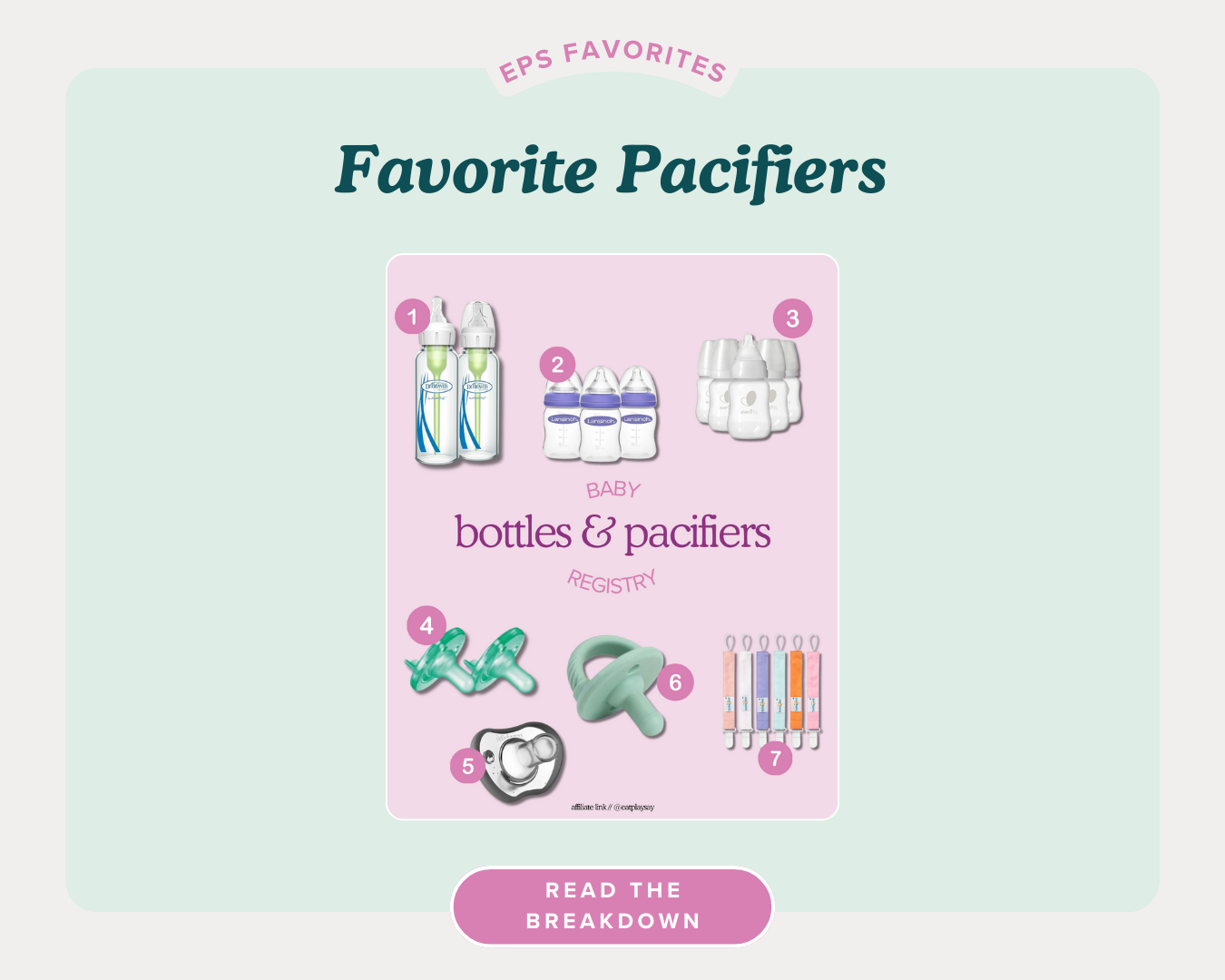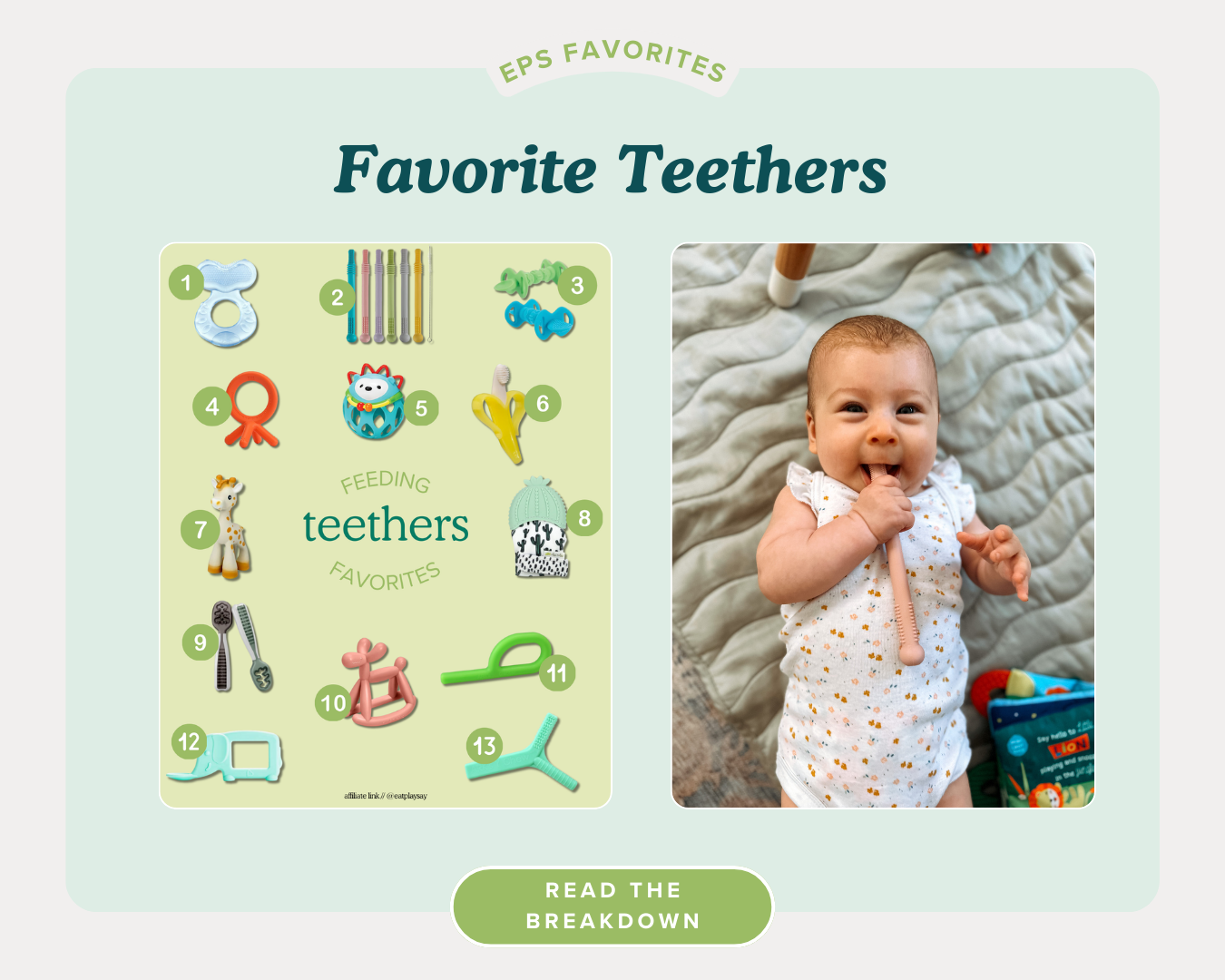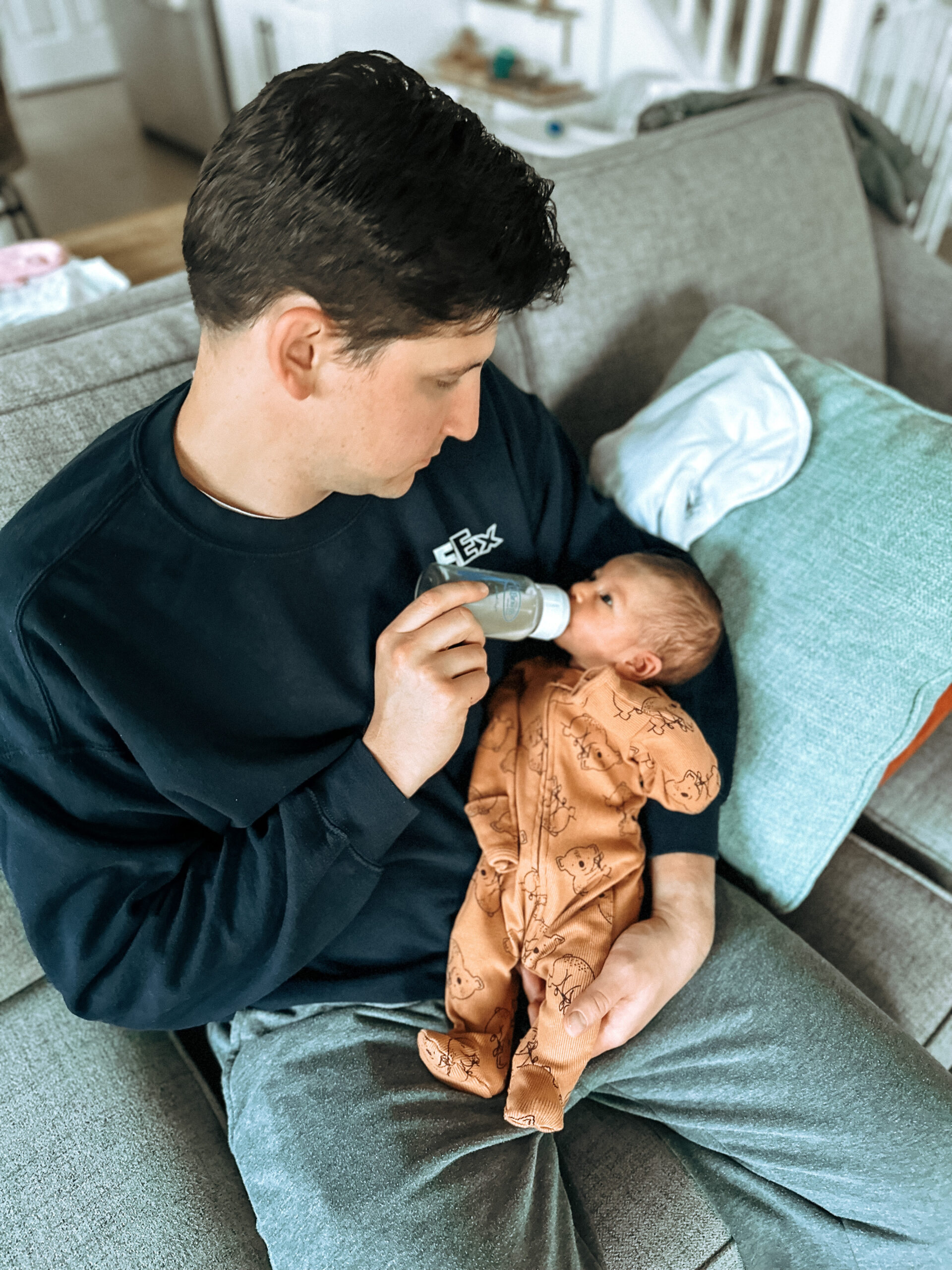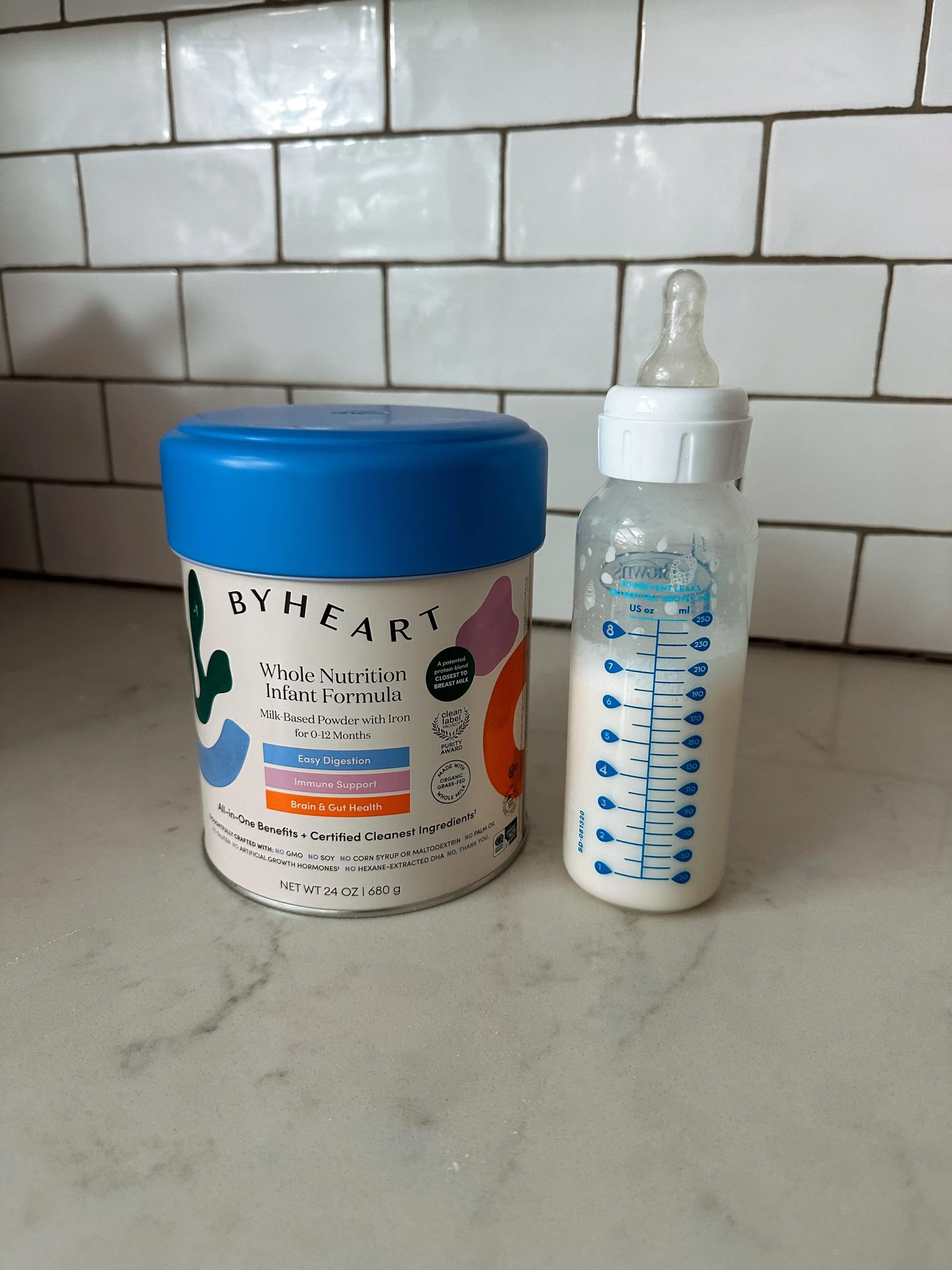This page contains affiliate links. We will receive a commission on qualifying purchases using these links.
No, they are not “bad.” Instead, we really need to be asking, “What is the purpose of the pacifier? and “When should I use it?”
Pacifiers are Not Bad
Pacifiers have a purpose: to pacify. Newborns especially find sucking very comforting. They may have even been sucking their thumb in the womb to soothe. It’s natural! Some infants have really high suck needs and even after breastfeeding or bottle feeding, they want to suck more, but aren’t actually hungry. Usually after the first few weeks of life, parents start to learn when baby wants to eat versus when baby wants to suck on a pacifier to soothe. And just when you feel like you’ve got that rhythm figured out, you read this blog that tells you that it’s time to give the pacifier a rest. Ah! And here is why:
Wean the Pacifier by 6 Months of Age
Um, what? Yes, 6 months, you read that right.
First, let’s lay down some guidelines. We as oral motor therapists recommend starting to wean the pacifier around 3-6 months of age, with the aim to be fully weaned between 6 months- 1 year of age.
Why? The suckling pattern that is reflexive at birth starts to integrate (or decrease) between 3-6 months, and babies start to volitionally (with purpose) suckle to eat from the breast or bottle, and they start to learn how to SUCK (like on a straw) around that time, as well. This transition from suckle to suck is important as baby learns how to drink from cups and straws, uses an up-and-down chomping pattern to manage solid foods, and eventually starts to wean off the bottle around 1 year. Since that natural reflexive change is happening in the body between 3-6 months of age, it makes sense that we also recommend decreasing pacifier use around that time.
But wait, um, what about the thumb? Same rules apply.
But when a thumb is attached to your body, you can’t just take it away, right? Stay tuned.
The Pacifier Pushes the Tongue Down
Let’s go over some basic anatomy.
STOP. Take some breaths here and notice how you are breathing. You’re likely breathing in and out through your NOSE with your mouth CLOSED. Notice where your tongue is. It is likely UP underneath your hard palate, with the tip of your tongue behind your front teeth.
That “resting tongue position” is so important. Did you know that the hard palate has SO many sensory receptors? Our tongue resting under the hard palate is calming us. It is helping us be regulated throughout the day. Taking breaths through our nose are meditative, while taking breaths through our mouth are not. These anatomical features of our tongue position and palate stimulation are so important. If I could shout this, I would!
In a lot of cases (not all!), extended pacifier use or thumb sucking into toddlerhood can (again, not always) indicate that the tongue is not resting where it should be. So your little one might be using a thumb or a pacifier to do what the tongue should be doing at rest- providing that sensory input to the hard palate.
Does the Shape of the Pacifier Matter?
Yes, there is a “preferred” shape of the pacifier, just like there is a preferred shape of the nipple on a bottle. Long and sloped nipples are preferred as they mimic the shape of a mother’s breast when actively breastfeeding. Pacifiers that have a flat (also called orthodontic) shape, or a bulbed shape at the tip, are not the most optimal. They push the tongue down, don’t promote tongue cupping, and can make a “shelf” for baby’s teeth/gums to rest when baby is not sucking.
Take a look at our Baby Registry Favorites for specific pacifiers we recommend.
Why Does My Baby Seem to Need a Pacifier
If your little one relies on the pacifier for sleep, uses it in play, or seems to suck her thumb a lot when she is tired, we need to look at some other things to help us understand WHY that is happening. Regardless of how old your child is, ask yourself these questions:
-
Does my child have an open mouth posture at rest? Are his lips parted slightly? Is he breathing through his mouth at all, even inconsistently?
-
Does my child seem nasally congested a lot? Does it seem laborious for him to breathe through his nose? Is he a noisy breather?
-
Does my child snore? Is she only able to sleep in a certain position? Can she not sleep on her back without snoring or startling herself awake from noisy breathing?
-
Does my child drool a lot? Does he have to wear a bib during the day to catch his secretions? Is his bottom lip always shiny with saliva?
-
Did or does my child have difficulty breastfeeding? Did or does my child have difficulty with eating solids or managing certain textures? Is my child older than 18 months and a messy eater while chewing foods?
-
Does my child have decreased clarity while talking? Slushy sounding speech? A tongue thrust or a “lisp?” Does her tongue seem to come forward when making certain sounds, which makes them sound imprecise?
**If the answer to these questions are “no” and your child is under a year, that is great! Baby is likely suckling to soothe, which can be expected at this age. Try to wean that pacifier by a year and keep hands busy in play to decrease thumb sucking. Remember to try and only offer the pacifier if your little one is not able to be calmed in other ways- since that is the purpose of the pacifier, to pacify! [Remember: Introduce teethers around 3 months to help increase jaw strength and replace pacifiers in play!]
**If the answer to these questions are “no” and your child is over a year old, but still uses a pacifier/sucks on their thumb, your child is also likely still suckling to soothe and calm. At this point, it is likely a habit, but may not be due to underlying oral motor difficulties.
Weaning the Pacifier
If you are interested in trying to decrease thumb sucking and pacifier use, try the following:
-
Offer crunchy snacks before bedtime/naptime to provide input to the mouth
-
Keep hands busy in play (you can look into a thumb block with guidance from a professional if you think that is appropriate for your child and something your family agrees on using)
-
Try to replace the pacifier with another soothing toy
-
Positively reinforce when your little one is not thumb sucking or using a pacifier
-
Don’t be too hard on yourself! If your little one is developing well, and you don’t have concerns about her oral motor skills or tongue position, take it slow during this transition.
-
Offer teethers if your little one will take them (Favorite Teethers for Baby & Toddler)
If You Answered YES to the Questions
**If you answered “yes” to any of these questions, regardless of how old your little one is, I recommend talking to an oral motor specialist about an evaluation to make sure that there isn’t an underlying issue (e.g., airway obstruction, tongue tie, oral tension, etc). There might not be! But it’s a good idea to ask questions and look into the WHY. As you can see, extended pacifier use and thumb sucking can (not always!) indicate that something else is going on, and if those underlying reasons are not addressed, the thumb sucking or pacifier use will be difficult to decrease. After a talking with a specialist, they can help you work towards decreasing pacifier use and thumb sucking.
Pacifiers Don’t Cause Speech-Language Delays
Lastly, I want to hit home that we can’t really say that extended pacifier use and persistent thumb sucking CAUSE a speech delay. We can’t generalize and claim that one thing directly causes another- and we shouldn’t. Because each child is different. However, we can state that we notice that children with persistent pacifier use and thumb sucking sometimes also have speech-language and feeding/oral motor difficulties. Why? Because those “habits” indicate that there may be something else underlying that is likely contributing to the speech-language delay or oral motor difficulties.
This blog was meant to be helpful and educate and not to cause panic or worry. If your little one is sucking their thumb or using a pacifier beyond a year old, you have not done anything wrong! By asking questions, you are doing everything right. If you are concerned about your little one, talk to a licensed oral motor therapist (SLP/OT) for help and support! Or you can book a virtual consultation with a member of our team!









Be the first to comment